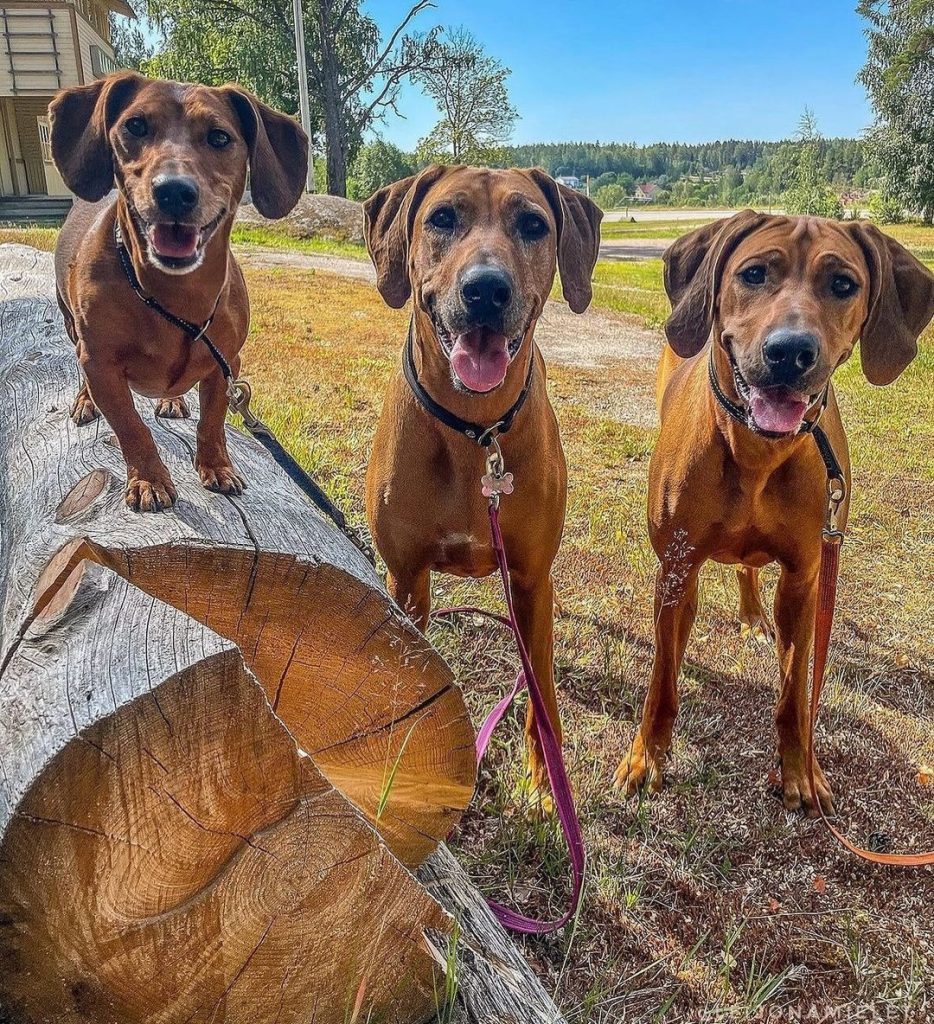Introduction to Training Rhodesian Ridgeback
Rhodesian Ridgebacks, known for their distinctive ridge along their back, are a breed that combines strength, agility, and a unique temperament. Training a Rhodesian Ridgeback can be both a challenging and rewarding experience. The key to successful training lies in understanding the breed’s nature and characteristics and applying consistent and effective training techniques.

Understanding the Unique Nature of Rhodesian Ridgebacks
Originating from Southern Africa, Rhodesian Ridgebacks were bred for their tracking ability and endurance. These dogs are known for their intelligence, independence, and protective nature. They are often reserved with strangers but loyal and affectionate to their families. Understanding these traits is crucial in training, as it helps tailor the approach to suit the dog’s inherent qualities. For instance, a Ridgeback’s independent nature might require more patience and positive reinforcement during training sessions.
The Importance of Early and Consistent Training
Early training and socialization are vital for Rhodesian Ridgebacks. Training at a young age helps shape their behavior and ensures they grow into well-adjusted adults. Consistency is another cornerstone of practical training. These dogs respond best to a consistent routine and clear boundaries. Establishing yourself as the pack leader firmly but gently is essential. This breed does not respond well to harsh training methods; instead, they thrive on positive reinforcement and rewards for good behavior.
Basic Training Principles for Rhodesian Ridgebacks
Training a Rhodesian Ridgeback requires understanding fundamental training principles that cater to the breed’s characteristics. A structured approach will help establish a strong bond and mutual respect between the dog and its owner.
1. The Role of Positive Reinforcement
Positive reinforcement is critical when training Rhodesian Ridgebacks. This technique involves rewarding desired behaviors and encouraging the dog to repeat them. Rewards can be in the form of treats, praise, or play. Since Ridgebacks are intelligent and sensitive, they respond well to this positive approach, making training sessions enjoyable and something they look forward to.
2. Setting Realistic Training Goals and Expectations
It’s essential to set realistic goals and expectations during training. Each dog is unique, and what works for one may not work for another. Start with basic commands and gradually progress to more complex tasks. Recognize the dog’s limits and be patient; some skills may take longer. Celebrate small victories along the way to keep both you and your Ridgeback motivated.
3. The Impact of Consistency in Training
Consistency is vital in training Rhodesian Ridgebacks. Consistent commands, tone of voice, and training routines help the dog understand what is expected. Inconsistencies can lead to clarity and help the training process. Stick to a regular training schedule and use the exact words for commands to reinforce learning.
4. Utilizing Clear and Simple Commands
Simplicity is crucial when it comes to commands. Rhodesians, like most dogs, respond best to short, clear instructions. Commands like “sit,” “stay,” “come,” and “heel” should be distinct and used consistently. Avoid using long sentences or varying phrases for the same command, as this can confuse the dog.
Effective Training Techniques – From Puppy to Full-Grown Dog

Effective training techniques are crucial in harnessing the intelligence and energy of Ridgebacks. These methods not only teach basic obedience but also help in addressing specific behavioral aspects unique to the breed.
Establishing Basic Obedience Commands
The foundation of any training regimen is establishing basic obedience commands. For Ridgebacks, this involves teaching commands like ‘sit,’ ‘stay,’ ‘come,’ and ‘heel.’ Due to their intelligence, Ridgebacks can learn these commands relatively quickly. However, their independent nature requires more patience and repetition. Use positive reinforcement to encourage compliance and keep training sessions short and engaging to maintain their interest.
Addressing Toilet Training as a Distinct Aspect
Toilet training is an essential aspect of training, especially for puppies. Start by establishing a routine and taking your Ridgeback to the same spot to relieve itself. Use a command like “go potty” to create an association. Reward your dog immediately after they’ve done their business in the right place. Consistency and patience are essential, as accidents will happen, but they should decrease over time.
Socialization Strategies
Socialization is crucial for Rhodesian Ridgebacks to ensure they are comfortable in various environments and with different people and animals. Expose your dog to different sights, sounds, and experiences in a controlled manner from a young age. Positive experiences during these socialization sessions are vital to prevent fear or aggression later in life.
Redirecting and Discouraging Undesired Behaviors
Redirecting and discouraging undesirable behaviors, such as excessive barking or chewing, is essential. Instead of punishment, which can lead to fear or aggression, use positive reinforcement to encourage alternative, desirable behaviors. For instance, if your Ridgeback chews on shoes, redirect them to a chew toy and praise them for using it.
Recognizing and Responding to Non-Verbal Cues
Understanding and responding to non-verbal cues is essential in training. Ridgebacks are expressive and will communicate through body language, such as tail wagging, ear positioning, and eye contact. Learning to interpret these signals can help understand their needs, moods, and responses to training.
Advanced Training and Behavioral Management
As Ridgeback matures, their training can advance to more complex levels, focusing on obedience and behavior management. This stage is crucial for ensuring your dog remains well-behaved and responsive.
Advanced Obedience and Skill Training
Advanced training builds upon the basic obedience skills your Ridgeback has already learned. Here are some advanced skills to consider:
- Heel with Distractions: Train your Ridgeback to heel even in distracting environments.
- Distance Commands: Practice commands like ‘stay’ or ‘come’ from a greater distance.
- Emergency Stop: Teach your dog to stop immediately on command, which is helpful in potentially dangerous situations.
- Fetch Specific Items: Train your Ridgeback to fetch specific items by name, enhancing their ability to understand and follow complex commands.
- Agility Training: Engage in agility training to improve their physical skills and mental agility.
- Trick Training: Teaching tricks can be a fun way to challenge your dog’s intelligence and strengthen your bond.
Managing Specific Behavioral Challenges
Behavioral challenges may arise as Ridgebacks grow. Address issues like excessive barking, digging, or jumping up on people with specific training strategies. Understand the root cause of these behaviors – boredom, anxiety, or territoriality – and address them through targeted training and environmental changes.
Training Techniques for Mature Canine

As Rhodesian Ridgebacks mature, their training needs evolve. It’s essential to adapt your techniques to suit their changing physical and mental capabilities. Here are some tailored training techniques for mature Ridgebacks:
- Advanced Obedience Refinement: Revisit basic commands and add complexity, like performing commands at a distance or in busier environments.
- Mental Stimulation Exercises: Incorporate puzzle toys and scent games to keep their minds sharp. Mental stimulation is as essential as physical exercise, especially for older dogs.
- Gentle Agility Training: If physically able, involve them in low-impact agility exercises. This can help maintain their physical fitness without straining their joints.
- Controlled Socialization: Continue to socialize your mature Ridgeback in controlled environments. This helps in maintaining their social skills and preventing the development of anxieties or aggression.
- Health-Adjusted Physical Activities: Adjust the intensity of physical activities based on their health status. For example, shorter walks or swimming can be good alternatives for dogs with joint issues.
- Responsive Training: Be responsive to changes in behavior that may indicate health issues and adjust your training accordingly.
- Regular Health Check-ups: Regular vet visits will help you stay on top of any health issues affecting training and behavior.
Implementing these techniques ensures that your mature Rhodesian Ridgeback remains engaged, healthy, and well-behaved.
Training Support and Resources
Training a Rhodesian Ridgeback, while rewarding, can sometimes be challenging, especially for first-time owners. Knowing when to seek professional help, finding suitable online training courses, and participating in community support and group classes can significantly impact your training journey.
When to Seek Professional Help
Professional help can be invaluable in addressing specific training challenges or behavioral issues that go beyond the scope of basic training. Here are some scenarios where seeking a professional might be beneficial:
- Persistent Behavioral Problems: If your dog exhibits persistent and unmanageable behaviors such as aggression, extreme fear, or separation anxiety, it’s essential to consult a professional dog trainer or behaviorist.
- Lack of Progress in Training: A professional can provide a fresh perspective and new techniques if you need to see progress despite your best efforts.
- Specialized Training Needs: Specialized trainers can offer the necessary expertise for specific training goals, like therapy dog training or advanced agility.
- New Challenges with Aging Dogs: Older dogs may develop new behaviors or need adjustments in their training approach due to age-related changes.
Professional trainers can provide personalized guidance tailored to your dog’s temperament and needs, ensuring a more effective and efficient training process.
Recommended Online Training Courses
Online training courses are an excellent resource for Rhodesian Ridgeback owners, offering the flexibility to learn at your own pace. Here are some highly recommended courses and platforms:
- K9 Training Institute (Best Overall): This course uses body language as the foundation for communicating with dogs and addressing various behavioral issues. Respected experts lead it and offer a unique approach using gentle, non-confrontational techniques.
- SpiritDog Training (Best Variety): Known for its wide range of programs and high success rates, SpiritDog Training offers courses for puppies, adolescent dogs, senior dogs, and dogs with behavioral issues. The platform is user-friendly mobile-friendly, and includes a variety of modules covering everything from obedience training to tackling reactivity.
- Dunbar Academy (Best Monthly Membership): Led by Dr. Ian Dunbar, these courses focus on positive reinforcement and cover various topics, from puppy training to aggression prevention. The Academy offers a mix of individual courses and a monthly membership, providing access to extensive training resources and an exclusive Facebook group for community support.
- Brain Training for Dogs (Best Low-Cost): Created by a certified dog trainer, this course uses simple, force-free techniques to address behavioral issues. It provides easy-to-understand directions, video demonstrations, and access to a private forum for community interaction.
- Brandon McMillan’s Online Dog Program (Best for Obedience Training): Led by an Emmy Award-winning animal trainer, this course focuses on basic obedience, manners, and house training. It suits beginners and offers a structured, engaging, and user-friendly learning experience.
These online courses often include video tutorials, written materials, and sometimes even personal consultation options, making them a comprehensive choice for at-home training.
Community Support and Group Training Classes
Participating in community support groups and group training classes can be highly beneficial. Here are some advantages:
- Learning from Others’ Experiences: Community forums and social media groups dedicated to Ridgebacks are excellent for sharing experiences, tips, and advice.
- Group Training Classes: These classes allow your dog to socialize and learn in a different environment. It also lets you meet other dog owners and learn from their experiences.
- Breed-Specific Clubs and Associations: Joining a Rhodesian Ridgeback club or association can provide access to breed-specific resources, events, and training sessions.
Group classes and community interactions not only aid in training but also help in understanding the breed better through shared experiences and knowledge.
Special Considerations in Training

Training a Rhodesian Ridgeback, like any dog breed, requires attention to specific special considerations. These considerations ensure that the training is practical and caters to the dog’s physical and mental well-being.
1. Tailoring Training Sessions to Your Dog’s Needs
Every Rhodesian Ridgeback is unique, with its personality, learning pace, and preferences. Tailoring training sessions to suit your dog’s needs can significantly enhance the effectiveness of the training process. Here’s how to do it:
- Assess Your Dog’s Learning Style: Some dogs respond better to visual cues, while others prefer verbal commands or physical guidance.
- Consider Energy Levels: Adjust the length and intensity of training sessions according to your dog’s energy levels. Younger dogs might have more energy and require more physical activity, while older dogs might benefit from shorter, more focused sessions.
- Pay Attention to Health: Health issues can affect a dog’s ability to participate in specific training activities. Always consider your dog’s physical condition when planning training exercises.
2. Understanding and Managing Barking Behaviors
Barking is a natural form of communication for dogs, but excessive barking can be a nuisance. Understanding why your Rhodesian Ridgeback barks is the first step in managing this behavior:
- Alert/Warning: Barking at strangers or potential threats is common. Teach your dog to differentiate between normal and abnormal situations.
- Attention-Seeking: If your dog barks for attention, it’s important not to reinforce this behavior by responding every time. Instead, reward quiet behavior.
- Boredom or Loneliness: Ensure your Ridgeback gets enough physical and mental stimulation to prevent boredom-related barking.
- Fear: Dogs often bark when they are scared. Identifying and addressing the root cause of the fear is crucial.
3. Appropriate Age for Spaying or Neutering
The decision to spay or neuter your Rhodesian Ridgeback, and at what age, can impact their training and behavior. Consider the following:
- Health Benefits: Spaying and neutering can prevent specific health issues and unwanted behaviors. However, the timing can affect the dog’s physical development.
- Behavioral Changes: These procedures can lead to changes in behavior, which can be beneficial (reduced aggression, less marking territory) and challenging (potential weight gain, altered energy levels).
Consult with your veterinarian to determine the best age for spaying or neutering your dog, considering health and behavioral factors.
4. Addressing Common Health Concerns in Training
Ridgebacks, like any breed, have specific health concerns that can affect training:
- Hip Dysplasia: This genetic condition can cause pain and mobility issues. Avoid exercises that put excessive strain on the hips and joints.
- Dermoid Sinus: A common genetic issue in Ridgebacks. Be mindful of this when handling your dog, especially around the neck and spine.
- Thyroid Problems: Thyroid issues can affect energy levels and mood, impacting training responsiveness.
Regular health check-ups and a training regimen that considers these health issues will ensure your Ridgeback remains healthy and responsive to training.

Conclusion
Training a Rhodesian Ridgeback is a journey filled with challenges and rewards. Understanding the unique nature of this breed and employing the proper training techniques can lead to a fulfilling relationship between you and your dog. From establishing basic obedience to addressing advanced behavioral issues, each step in training should be approached with patience, consistency, and understanding. Every Rhodesian Ridgeback has its personality and needs, so tailoring your training approach is crucial. Utilize the resources available, such as online courses and community support, and never hesitate to seek professional help. With dedication and the right approach, training your Rhodesian Ridgeback can be an enriching experience, resulting in a well-behaved, loyal, and loving companion.
